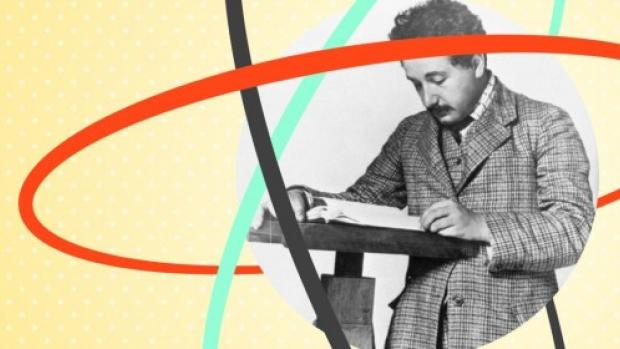"Einstein and the Quantum:" Honoring Former Professor Herbert Morawetz

Most people have heard Albert Einstein’s pronouncement that God does not play dice with the universe (originally written in a letter to friend and fellow scientist Max Born) and have interpreted it to mean that the famed physicist totally dismissed quantum mechanics. That would be a mistake, according to A. Douglas Stone, the chair of the Applied Physics Department at Yale, director of the school’s Division of Physical Sciences, and the Carl A. Morse Professor of Applied Physics. In fact, Stone contends, Einstein thought more about the nature of atoms, molecules, and the emission and absorption of light—the core of what we now know as quantum theory—than he did about relativity, the work for which he is most remembered.
Stone—whose own research focuses on theoretical condensed matter and optical physics, quantum transport phenomena in disordered media, mesoscopic electron physics, non-linear and chaotic dynamics, quantum and wave chaos, quantum measurement, and quantum computing—was at the NYU Polytechnic School of Engineering to deliver the 2014 Distinguished Lecture Honoring Professor Herbert Morawetz, whose former students sponsor the event each year. It was particularly auspicious that this year’s lecture was held on October 16; it was Morawetz’s 99th birthday, and although the beloved and respected professor was too ill to attend himself, he conveyed his gratitude through Professor Bruce Garetz, who served as master of ceremonies.
Stone’s talk would have delighted Morawetz, who was known for his boundless intellectual curiosity and scientific rigor—an American Chemical Society profile prepared in honor of his 70th birthday succinctly calls him a “Man of Ideas.” Morawetz, now a towering figure in the history of the NYU Polytechnic School of Engineering, had earned his doctoral degree at what was then known as the Polytechnic Institute of Brooklyn in 1950 and joined the faculty the following year, achieving the status of Institute Professor Emeritus in 1986. He went on to inspire countless students and make major contributions to polymer science; it could even be said that he, quite literally, wrote the book on the topic, penning Polymers: The Origins and Growth of a Science in 1985.
Stone’s own recent book, Einstein and the Quantum: The Quest of the Valiant Swabian, which was named one the best books of 2013 by the editors of Scientific American and chosen by radio host Ira Flatow as a Science Friday Book Pick, was widely acknowledged as a engaging mixture of physics, biography, and history, and that combination marked his lecture as well. Einstein, Stone asserts, was the pivotal force in early quantum theory, not, as many assume, Max Planck or Niels Bohr. So important was his work on the topic that Max Born opined that even had he never addressed relativity—the work that in many respects overshadowed everything else Einstein did—he would still have been the greatest physicist of the 20th century.
Einstein himself called his quantum work “revolutionary,” writing to Conrad Habicht, as Stone related, that he would be sending him a group of papers to read: “The first deals with radiation and the energy properties of light and is very revolutionary. The second paper is a determination of the true sizes of atoms. The third proves that bodies on the order of magnitude 1/1000 mm, suspended in liquids, must already perform an observable random motion that is produced by thermal motion. The fourth paper is only a rough draft at this point, and is an electrodynamics of moving bodies which employs a modification of the theory of space and time.”
Einstein’s seemingly casual mention of a modification of the theory of space and time sent a ripple of amusement through Pfizer auditorium, as did Stone’s descriptions of the physicist’s youthful arrogance. Stone wittily asserted that Einstein was deserving of multiple Nobel Prizes—if only scientists were ranked like fantasy sports teams. There was also plenty of serious food for thought, and everyone left the auditorium informed, as well as entertained.
Professor Avi Ulman, echoed the sentiments of many following the lecture, saying, “I was very surprised to learn that Einstein has such seminal contributions to quantum mechanics. Professor Stone did an excellent job of discussing a complicated subject in a way that appealed even to non-physicists like myself.” After learning so many fascinating facts about him, most audience members agreed that Einstein would certainly occupy the top spot on their own fantasy physics team.




